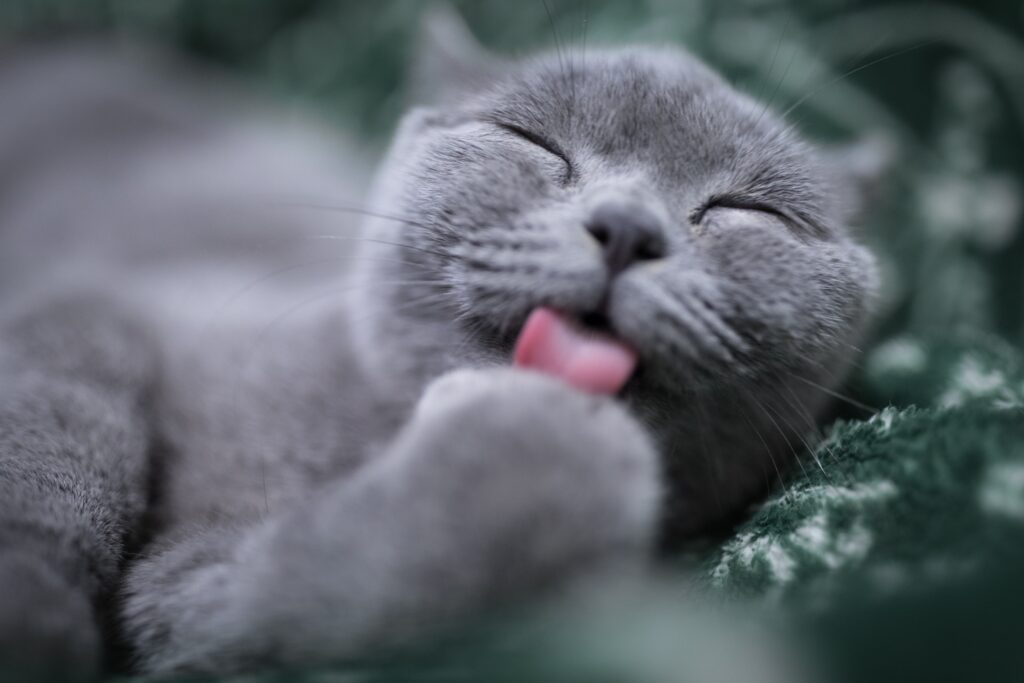Do Kitties Groom Themselves to Stay Clean?
Cats are well-known for their impeccable grooming habits.
They spend a significant portion of their day licking their fur, leaving many cat owners wondering: do kitties groom themselves to stay clean?
In this article, we’ll explore the fascinating world of feline grooming, understand why cats are such meticulous self-cleaners, and the benefits
it offers to their health and well-being.

The Art of Feline Grooming
Instinctual Behavior
Grooming is an instinctual behavior in cats that begins in kittenhood.
Mother cats groom their kittens to stimulate blood flow, clean them, and strengthen the maternal bond.
Kittens quickly learn to groom themselves by mimicking their mother’s actions.
The Lick of Cleanliness
A cat’s tongue is a remarkable tool for grooming. It is covered in tiny, backward-facing barbs called papillae, which catch dirt, loose fur, and debris.
This self-cleaning process helps cats maintain their fur’s cleanliness and condition.
The Benefits of Self-Grooming
Cleanliness and Hygiene
The primary benefit of self-grooming is cleanliness. Cats remove dirt, sweat, and excess oils from their fur, preventing it from becoming soiled
and matted.
This cleanliness is essential for maintaining their insulation and waterproofing.
Temperature Regulation
Grooming also helps cats regulate their body temperature.
The saliva on their fur evaporates, creating a cooling effect during hot weather.
Conversely, in cold weather, the layer of saliva can act as insulation.
Stress Reduction
Grooming is not only about physical cleanliness but also mental well-being.
Cats often groom themselves when they are relaxed and content. It can be a form of self-soothing, helping them manage stress and anxiety.
Signs of a Well-Groomed Cat
Smooth and Shiny Coat
A well-groomed cat typically has a smooth and shiny coat. Their fur lies flat and evenly, and it feels soft to the touch.
Grooming distributes natural oils, contributing to this healthy appearance.
No Mats or Tangles
Regular grooming prevents mats and tangles in a cat’s fur. Mats can be painful and lead to skin issues,
so preventing them through self-grooming is crucial.
No Excessive Shedding
Healthy grooming helps cats shed loose fur, reducing the amount of hair they ingest during self-grooming.
This can minimize hairballs and digestive issues.
When Grooming Becomes a Concern
Over-Grooming
While grooming is healthy, excessive grooming can be a sign of an underlying issue, such as allergies, skin irritations, or stress.
If you notice your cat grooming excessively or developing bald spots, consult a veterinarian.
Inability to Groom
Elderly or obese cats may struggle with grooming due to limited mobility. In such cases, regular brushing by the owner or professional grooming
may be necessary to maintain their cleanliness.
Conclusion
In conclusion, kitties do groom themselves to stay clean, and it’s a vital aspect of their daily routine.
Self-grooming not only ensures their physical cleanliness but also contributes to their mental well-being. As cat owners,
it’s essential to recognize the significance of grooming in a cat’s life and support their natural behavior.
Providing a clean environment, a balanced diet, and regular veterinary care can help ensure that your cat’s grooming habits remain healthy
and effective.
By understanding the benefits of self-grooming and monitoring your cat’s grooming behavior, you can help them lead a happy and healthy life.
So, the next time you see your feline friend indulging in a thorough grooming session, know that they are not only staying clean but also enjoying
a moment of relaxation and self-care.
FAQs
- Do all cats groom themselves equally, or are some more meticulous than others?
- Grooming habits can vary among cats. Some are more meticulous groomers, while others may groom less frequently.
Individual preferences and health can influence grooming behavior.
- Grooming habits can vary among cats. Some are more meticulous groomers, while others may groom less frequently.
- Why do cats sometimes groom their owners or other animals?
- Grooming is a social behavior for cats. When they groom their owners or other animals, it can be a sign of affection and bonding.
It’s a way for cats to show they care.
- Grooming is a social behavior for cats. When they groom their owners or other animals, it can be a sign of affection and bonding.
- Can I help my cat with grooming by brushing them regularly?
- Yes, regular brushing can assist with grooming, especially for long-haired cats or those who may have difficulty grooming themselves.
It helps prevent mats, reduces shedding, and strengthens the bond between you and your cat.
- Yes, regular brushing can assist with grooming, especially for long-haired cats or those who may have difficulty grooming themselves.
- Are hairballs a result of grooming, and can they be prevented?
- Hairballs can result from ingesting loose fur during grooming.
Regular brushing can reduce the amount of fur your cat ingests, which may help prevent hairballs.
There are also hairball prevention products available, but consult your veterinarian for guidance.
- Hairballs can result from ingesting loose fur during grooming.
- Is it normal for cats to groom specific areas more than others?
- Yes, cats may focus their grooming on areas that are more challenging to clean, such as their face, paws, and genital area.
These areas require extra attention to maintain cleanliness.
- Yes, cats may focus their grooming on areas that are more challenging to clean, such as their face, paws, and genital area.
